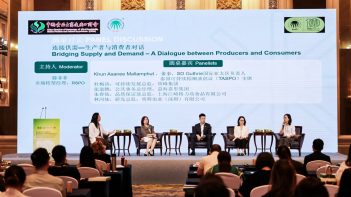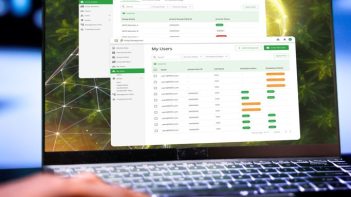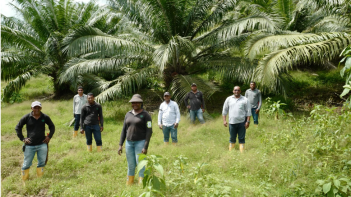Participants travelled virtually to a sustainable oil palm plantation and orangutan conservation area in Indonesia to see how palm oil can be done right.
Jakarta, 18 November 2021: The Roundtable on Sustainable Palm Oil (RSPO) Secretariat hosted a virtual tour of members’ sustainable oil palm plantation and orangutan conservation area today, to shed light on the positive impact palm oil can have for people, planet and prosperity, when grown according to RSPO standards.
RSPO, together with Interchurch Organisation for Development Cooperation (ICCO), PT Bumitama Gunajaya Agro (BGA), PT Sawit Sumbermas Sarana (SSMS) Tbk, and the Borneo Orangutan Survival Foundation (BOSF) also used the event as a platform to call on all parties in the palm oil supply chain to take greater responsibility for driving market transformation.
The event saw more than 500 stakeholders including media, consumers and downstream actors from the Asia Pacific region attend the second series of this virtual event.
RSPO Indonesia’s Outreach & Engagement Manager, Margareth Naulie Panggabean said, “We wanted to host this event to demonstrate to stakeholders in the region that certified sustainable oil palm cultivation is a practical and realistic solution to the challenges and concerns the palm oil industry is facing.
“However, there are two sides to this solution and we need to see greater commitment and uptake of sustainable palm oil from the big four: India, China, Malaysia, and Indonesia, if we are to achieve our shared vision of making sustainable palm oil the norm,” she said.
During the virtual event, participants were able to experience how oil palm plantations are managed sustainably, how companies and communities can collaborate and support each other without conflict, the management of conservation areas in oil palm plantations, and how orangutan conservation areas in Indonesia are being sustainably managed by RSPO members.
Lim Gunawan Hariyanto, CEO of PT Bumitama Gunajaya Agro said, “As a company committed to sustainable oil palm development, we strive to be an industry leader in responsible, inclusive, and fair palm oil production. In our efforts, we collaborate with experts, multiple tiers of government, and other stakeholders to alleviate the loss of biodiversity and natural habitats, protect and restore ecosystem services for local communities that depend on the forests for their livelihoods, and dampen the effects of climate change,” he said.
A highlight of the virtual tour was the pre-release habitat for orangutans on islands within the Salat Island Cluster.
Jamartin Sihite, CEO of BOS Foundation shared that a total of 98 orangutans have undergone the pre-release stage of rehabilitation within the Salat Island Cluster, and of these, 34 orangutans have already been released back into the wild.
“This collaboration involves participation from many stakeholders including the Central Kalimantan Provincial Government, the Pulang Pisau District Government, the Central Kalimantan Natural Resources Conservation Center (BKSDA), communities in Jabiren Raya District, and the BOS Foundation.
“We are grateful for the support of PT SSMS Tbk and its global partners who have helped fund this very important initiative and we sincerely hope that this virtual tour will attract more parties to work collaboratively in efforts to create a more environmentally-friendly and sustainable palm oil industry that also supports orangutan conservation in Indonesia,” he said.
Vallauthan Subraminam, CEO PT Sawit Sumbermas Sarana Tbk said, “SSMS has participated in various environmental initiatives prioritised with the principles of sustainable palm oil business. These principles become our foundation in every line of business to deliver maximum results to all stakeholders. The Salat Island conservation project involves various parties to prosper and increase added value for regional and the local community. SSMS with them has implemented strategic steps to achieve sustainable business practices,” he said.
ICCO supported the virtual tour through their Responsible and Sustainable Palm Oil Plantations in Indonesia (RESBOUND) project, which focuses on promoting responsible business in palm oil plantations, encouraging multi-stakeholder dialogue and supporting palm oil workers.
Lenneke Braam, Asia Cluster Regional Director of ICCO said, “Palm oil is a contentious issue globally, however, what many do not realise is that countless families rely on this crop for their livelihood, thus, we believe that engaging in public-private partnerships is key to creating effective and sustainable change in the sector,” she said.
About RSPO:
The Roundtable on Sustainable Palm Oil (RSPO) was formed in 2004 with the objective of promoting the growth and use of sustainable oil palm products through credible global standards and engagement of stakeholders. RSPO is a not-for-profit, international, membership organisation that unites stakeholders from the different sectors of the palm oil industry including oil palm producers, palm oil processors or traders, consumer goods manufacturers, retailers, banks and investors, environmental or nature conservation NGOs, and social or developmental NGOs.
This multi-stakeholder representation is mirrored in the governance structure of RSPO such that seats in the Board of Governors, Steering Committees and Working Groups are fairly allocated to each sector. In this way, RSPO lives out the philosophy of the “roundtable” by giving equal rights to each stakeholder group, facilitating traditionally adversarial stakeholders in working together to reach decisions by consensus, and achieving RSPO’s shared vision of making sustainable palm oil the norm.
The seat of the association is in Zurich, Switzerland, while the secretariat is currently based in Kuala Lumpur with satellite offices in Jakarta (ID), London (UK), Zoetermeer (NL), Beijing (CN) and Bogotá (CO).
For further information, kindly contact:
| Margareth Naulie Panggabean
Outreach & Engagement Manager – Indonesia |
RSPO Communications Team |
Keep reading

Access into prisma

10 Years of RSPO in China: Driving Palm Oil Transformation Towards Sustainability

Updated Trace Function in prisma

Call for Expression of Interest: Independent Investigation of a Complaint

Latin American Smallholders, Key Global Brands Gather in Peruvian Amazon to Advance Sustainable Palm Oil

RSPO Forum for Members and Certification Bodies 2025: Strengthening Capacities and Building Bridges with RSPO Members

From Violence to Prosperity: Cultivating Sustainable Palm Oil in San Pablo, Colombia




